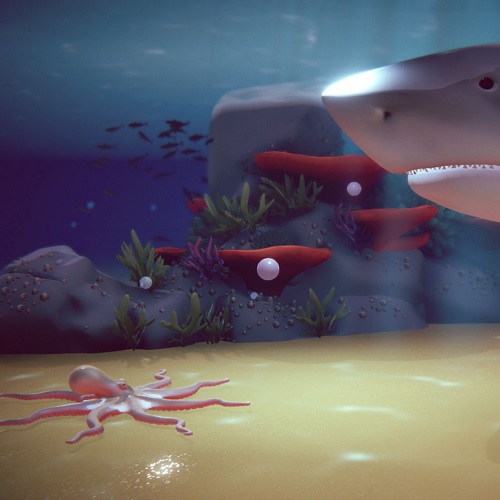30 March 2021
 The Netflix documentary My Octopus Teacher captivated audiences last year, shining light on an elusive sea creature we know little about.
The Netflix documentary My Octopus Teacher captivated audiences last year, shining light on an elusive sea creature we know little about.
Now researchers from the University of South Australia are giving people the chance to delve deeper into the underwater world of octopuses with the launch of a new Tamagotchi-inspired app.
Released this week as part of MOD.’s IT’S COMPLICATED exhibition, the Octopus Estate app – adapted from the exhibit of the same name – will encourage users to raise their own virtual octopus, making sure it eats, flees, hides and scares its way to adulthood.
UniSA marine ecologist Dr Zoe Doubleday and colleague Dr Jasmin Martino were transformed into avatars for the game, where they draw on their own research to provide tips and facts to help users keep their octopus alive.
Dr Doubleday says that while octopuses have long attracted attention in popular culture due to their quirkiness and mysterious existence, the app will offer people a glimpse into the secret lives of octopuses.
“Octopuses are like the underdogs of the marine science world – compared to fish, we know relatively little about them,” she says.
“This is why I started researching octopuses in the first place. Now through the app, we can share what we know about them with the wider community – everyone can have their own octopus teacher.
“There are more than 300 discovered species of octopuses, which live everywhere from the deepest of seas to intertidal rock pools, from the tropics to Antarctic waters.
“They are incredibly smart but operate in ways completely different from humans. They can sense light with their arms, for example – and each one of those arms has its own brain.”
Dr Doubleday and her colleagues have spent the past two years exploring species of octopuses in South Australian waters, working alongside a local octopus fisher on the Eyre Peninsula. She hopes the research will improve the understanding of the State’s octopus population.
“My research focuses on understanding the biology of these fascinating creatures and which species of them call South Australia home,” she says.
“We can use this information to learn how to fish them sustainably, potentially contributing to the growth of South Australia’s valuable seafood industry.
“Right now, octopus are generally caught and sold as just that – octopus – while fish are sold by their species such as King George whiting or snapper. In South Australia, we had no idea what species were being caught but that’s now changing as we find out more.
“Perhaps one day Venus Bay octopuses might enjoy the same reputation as Coffin Bay oysters.”
While she never imagined contributing to an app in her career as a scientist, Dr Doubleday says the experience has illustrated a new way of sharing research with the public.
“The app is real gamechanger in how we communicate science – it's tangible and long lasting,” she says.
“I’m really excited because this game will hopefully reach the minds of people who might not engage with science or the environment normally.”
The Octopus Estate app will be available to download for free on Google Play and the Apple Store from March 30. It was designed by MOD. in partnership with the Queensland University of Technology and is based on the touchscreen exhibit currently in galleries.
IT’S COMPLICATED is on now at MOD. in UniSA’s Bradley Building on North Terrace. The exhibition will run until 27 November 2021. For more information, go to mod.org.au.
Media contact: Rosanna Galvin T: +61 8 8302 0578 M: +61 434 603 457 E: rosanna.galvin@unisa.edu.au




